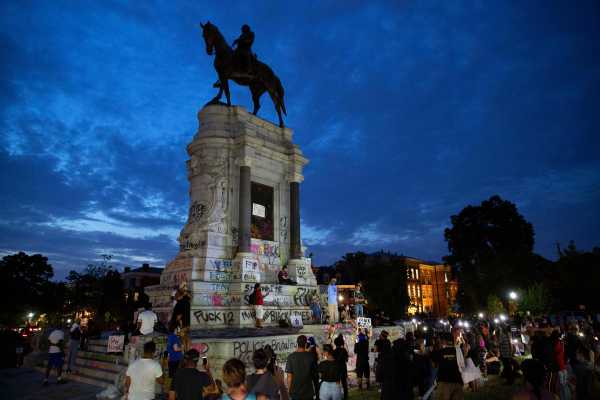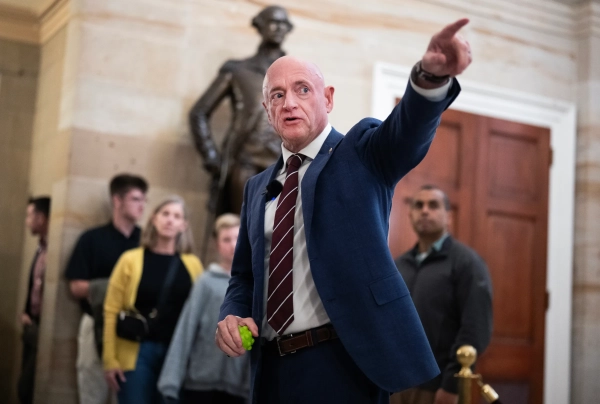
Protesters toppled a statue of a Confederate general in Richmond, Virginia, Saturday night — it was the latest of a number of monuments to the former slave-owning South to be pulled down by both protesters and public officials as people nationwide demand racial justice and an end to police brutality.
Protesters defaced the statue of of Confederate Gen. Williams Carter Wickham in the city’s Monroe Park, which sits on the Virginia Commonwealth University campus, before using ropes to pull it down.
One person urinated on it before running away, according to reporting by the Richmond Times-Dispatch. The statue had stood in the park since 1891.
The toppling of the monument in the Confederacy’s former capital comes as protests against police brutality and racism continue nationwide in the wake of the death of George Floyd, who was killed by a former police officer in Minneapolis on May 25.
Monuments celebrating the former Confederate States of America and its defense of slavery have been torn down or marred regularly since protests began. Earlier this week, protesters in Montgomery took down a statue of Confederate Gen. Robert E. Lee outside a high school named after him. In Nashville, a memorial to Edward Carmack, a former lawmaker and newspaper publisher who pushed racist views, was taken down outside the state Capitol. A Confederate monument in the middle of the University of Mississippi campus was tagged “spiritual genocide” and covered in red handprints.
But it’s not just protesters advocating for the removal of the statues — some state and local officials have endorsed plans to remove the controversial monuments and rename Confederacy-venerating roadways and buildings in former Confederate states like Kentucky and Louisiana.
Birmingham, Alabama’s mayor agreed to remove a five-story-tall Confederate statue despite a 2017 state law that protects it from harm. The New Orleans City Council is considering changing Jefferson Davis Parkway — named after the first and only president of the Confederate States of America — to honor Norman Francis, a civil rights leader and longtime president of Xavier University. Gov. Ralph Northam of Virginia announced on Thursday that the state will remove a statue of Lee from Richmond’s Monument Avenue, one of the largest pieces in a parade of Confederate statues on the street.
However, not all government officials with purview over Confederate monuments are willing to tear down the vestiges of a racist past — when discussions first arose years ago about removing the monuments, many pushed back. And this time, a number of politicians are doing the same.
The debate over Confederate symbols has been raging for years
The debate over the value of Confederate monuments goes back to 2015, when Dylann Roof, a self-described white supremacist, killed nine people in a predominantly black church in Charleston, South Carolina. Photos of Roof posing with a Confederate flag sparked debate in the state over whether the symbol is appropriate to be displayed at the state capitol. (It was eventually taken down.)
Since then, many Southern cities and states have been questioning their attachments to Confederate symbols. Vox’s German Lopez explains the divide:
Two years after the shooting in Charleston, as the debate wore on, local officials in Charlottesville, Virginia, agreed to take down a statue of Lee. That sparked protests, including a white nationalist Unite the Right rally that eventually turned deadly.
President Donald Trump weighed in on the issue shortly afterward, saying taking down Confederate monuments is “foolish” and “sad.”
But there’s plenty of historical evidence that Confederate monuments and symbols became popular not amid any wave of Southern pride, but in response to civil rights gains made by black Americans over the last century.
The flag’s popularity grew among Southern universities and social groups in the 1950s as a symbol of white culture. As President Harry Truman promised to promote civil rights, many — including the Ku Klux Klan — adopted the flag as a symbol of opposition.
Roy Harris, a Georgia politician who opposed civil rights, even said in 1951 that the flag was becoming “the symbol of the white race and the cause of the white people.”
Even as calls grow for Confederate monuments to come down, some officials don’t support the changes. Alabama Attorney General Steve Marshall sued the city of Birmingham Tuesday for pulling down a Confederate monument. And Marshall has demanded a $25,000 fine be paid in accordance with a state law that requires local governments to get permission from the state before removing buildings or monuments deemed historically significant.
A handful of other Southern states have similar laws protecting statues, making removals difficult for local officials and residents who want to replace Confederate monuments, but are at odds with state leaders.
Notably, there has also been no renewed discussion of taking down the many Confederate monuments that remain in the US Capitol building.
Lee, Davis, and Davis’s former vice president, Alexander Hamilton Stephens, are memorialized in statue in Statuary Hall. John Calhoun, a former South Carolina lawmaker, US vice president, and an ardent slavery advocate, and North Carolina’s Charles Aycock, former governor and white supremacist leader, are also enshrined in the building. In prior years, there was an effort led by black lawmakers, including legislation sponsored by Sen. Cory Booker and Rep. Barbara Lee, to replace these memorials — but these efforts failed.
Whether protests can overturn opposition to the removal of Confederate statues remains to be seen. Nor is it clear exactly what impact the protests will have on changing the police policies that disproportionately impact people of color. But as they continue, it is clear that they have already helped to prompt the dismantling of some of the symbols those American inequities were built upon.
Support Vox’s explanatory journalism
Every day at Vox, we aim to answer your most important questions and provide you, and our audience around the world, with information that has the power to save lives. Our mission has never been more vital than it is in this moment: to empower you through understanding. Vox’s work is reaching more people than ever, but our distinctive brand of explanatory journalism takes resources — particularly during a pandemic and an economic downturn. Your financial contribution will not constitute a donation, but it will enable our staff to continue to offer free articles, videos, and podcasts at the quality and volume that this moment requires. Please consider making a contribution to Vox today.
Sourse: vox.com






